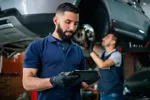In many ways, the remarketing of fleet cars is still based on a system of buying and selling that is thousands of years old: put a product in front of an interested audience and see who bids for it.
Obviously the process is more complicated than selling bags of grain 2,000 years ago, but the need for human interactivity and the laws of supply and demand have remained largely untouched.
But technology, and specifically the internet, is threatening to change the dynamic markedly.
British fleet remarketing is dominated by the two major players – BCA and Manheim –and their huge network of auction houses, and the successful results of their business models are plain for all fleets to see.
What about new firms and new services in the market?
Is there a future in the new internet innovations, alternative routes to market or differing styles of auction? Or will the ‘traditional’ auction house still dominate?
In many cases, size tends to dictate your remarketing policy, due to the simple expediency of having to move cars on quickly once they have come to the end of their fleet life.
Most leasing companies and large fleets will try some ‘alternative’, targeted remarketing channels, but in the end, it is a numbers and volumes game.
Robert Hester, Black Book value relationship manager at CAP, says: “There is definitely an increasing trend in the leasing companies for specific, targeted channels for their cars. But there will always be room for the general auction.
“The bigger fleet operators, the large contract hire companies, are pretty much about 95% auction-only policy, because it suits them.
“When you’re doing the volumes that they are – tens of thousands of cars a year – general auctions are the only viable way to shift the volume. You need fast throughput. The alternative is hundreds of cars sitting around going nowhere, costing you money and causing huge logistical problems.”
So what can a smaller auction house offer that isn’t covered by the two major companies?
Smaller leasing and large fleets that outright purchase their own vehicles can afford to be a bit more targeted.
Because they are not dealing with the same volumes as the really big firms, they can try other routes to get the best prices.
That generally means a slightly slower sale, but possibly at a better price in the end.
The smaller firms don’t have the capital of the huge bank-owned organisations, so need to be as cost effective as possible.
One of the most high profile business launches in the past decade in remarketing has been Fleet Auction Group (FLAG).
With one site in Leicestershire, it has had to offer a different approach from the nationwide groups, carving out a niche for itself in the process.
“FLAG is unique in its stance that customers have to be trade buyers, which is the first time anyone has done that to my knowledge. But it is having success,” says Robert Hester.
“Obviously if you went to a sale there, you wouldn’t see the volumes of people you might at an open sale, but those people are there to buy. In a normal auction the audience might comprise of 90% who are there to kick tyres, and find a bargain.
“I thought when FLAG took that step others would follow but nobody else has. It was an unusual approach, and there were a lot of sceptics saying it’ll never work, but it has.”
FLAG CEO Andrew Walker says: “The greater majority of our customers are main dealer types and we don’t allow the ‘public’ in. That’s not to think of them as the general public – if they do go to auctions, they don’t often buy cars – they just don’t have the expertise.
The public in the auction sense are those people buying a few cars to sell off their driveways, dabbling in use car sales, sometimes referred to as the ‘black market’.
“All of our customers have to show qualifying evidence that they are in the trade.”
FLAG claims its approach means that fleets can liquidate lots of stock in one go to reputable buyers, secure in the knowledge they are financially sound.
Another way of putting metal in front of potential buyers is through car supermarkets.
It’s an approach that some leasing companies use for limited numbers of cars, often on a sale or return basis and can prove a useful alternative outlet for good quality vehicles where they are trying to achieve the best possible prices.
Robert Hester says: “The arrangement generally is that the car will go to the supermarket at 60 days without charge, and at the end, if it hasn’t been sold, supermarkets agree to buy at a certain percentage.
“An advantage for the leasing company is getting the car moved into a sales arena at little cost.”
Of course, because the sales process generally involves members of the public, the time to sale is longer which may be the car supermarket’s problem, not the fleet’s, depending on the deal struck.
But there are a couple of issues that limit the effectiveness of car supermarkets. The principal one is that there are limitations on space.
Although many of these sites are large, compared to the hundreds of thousands of cars being defleeted every year, the available acreage is small.
And of course, in harder economic times, car supermarkets are reliant on the public still buying cars to turn stock over.
If that doesn’t happen, you could find cars coming back to you unsold, and you have to start the selling process again.
Leasing company ALD Automotive neatly avoids this problem by having has its own car supermarket in its native Bristol.
Electronic avenue
Perhaps the most potential for new avenues for selling ex-fleet cars lies with the internet, and there are a number of different business models, all of which have their pros and cons.
However, a number of firms believe they have cracked the formula.
One of those is Autoquake, which remarkets ex-fleet models direct to consumers.
Autoquake claims to offer consumers a simple way to buy ex-fleet vehicles online, using a ‘virtual showroom’ with more than 70 shots of the exterior and interior of the vehicles, an HPI check and a seven-day money back guarantee.
Of course, with no ‘real’ showroom and no need for salespeople, Autoquake believes it can sell cars at a lower price.
Many of these firms market their cars through eBay, as well as on their own site.
This, they believe, allows higher prices as the public pays a higher price for a car than the trade does.
And if the car is up for internet auction for seven days before it is sold, then turnaround times are relatively quick as well.
However, even in the most simple equation it is clear that this sort of selling process has a niche role at the moment.
Autoquake claimed in 2006 to have sold 2,000 cars through the internet in the last three years while a one-site auction house like Fleet Auction Group clears 45,000 vehicles a year.
Because of the nature of the internet buyer, fleets are having to find one buyer for each car, while a trade auction might see one buyer taking away several.
Autorola, which has been selling cars electronically to the trade since the 1990s, is actively marketing its services to fleet managers looking to sell ex-company cars. It has auctions in real time, and eBay-style time-specific auctions.
A spokesperson said: “People are becoming more receptive to buying electronically, and most companies have now got some sort of electronic remarketing supplier.
“It will continue and grow, especially as people become more comfortable with the process. Some people feel intimidated by bidding on the auction floor.”
So while there seems to be a place in the market for targeted electronic, internet-based sales, Robert Hester is sceptical of their ability to make a serious mark, in volume terms at least.
He says: “The major problem with internet sites is dealing volumes of vehicles. It is really difficult to get cars shifted quickly. The issue with the internet is that you still tend to get individual buyers rather than big volume buyers. The used car market is a touchy-feely business, people like to see what they are buying.”
There are innovations out there, but the necessity of dealing with huge volumes involved in fleet makes it difficult to see past big firms able to deal with big numbers.
As the leasing industry increasingly consolidates, it means larger fleets of 100,000-plus, meaning less opportunity for small companies to make a significant impact in volume terms for them.
However, as the biggest get bigger in a total market that stays roughly the same size, the smaller fleets and leasing companies will have to find more innovative way of getting good returns for defleeted vehicles.
So it could well be that we increasingly see a two-tier market: large leasing firms having to remarket in fast, high volumes, and small companies, lighter on their feet able to explore new possibilities.
Contacts
Autoquake
Tel: 0844 800 9406
www.autoquake.com.
Autorola
Tel: 01625 507015
www.autorola.co.uk.
BCA
Tel: 0845 600 66 44
www.bca-europe.com.
Bristol’s Car Supermarket (ALD)
Tel: 0870 325 0025
www.aldcarsupermarket.co.uk.
Cars Direct
Tel: 01536 40 99 99
www.cars-direct.ltd.uk.
Carsite
Tel: 01234 761145
www.carsite.co.uk.
Fleet Auction Group
Tel: 01530 833535
www.fleetauctiongroup.com.
Manheim
Tel: 0870 252 0431
www.manheim.co.uk.
Scottish Motor Auction Group
Tel: 01577 862564
www.smag.co.uk.















Login to comment
Comments
No comments have been made yet.